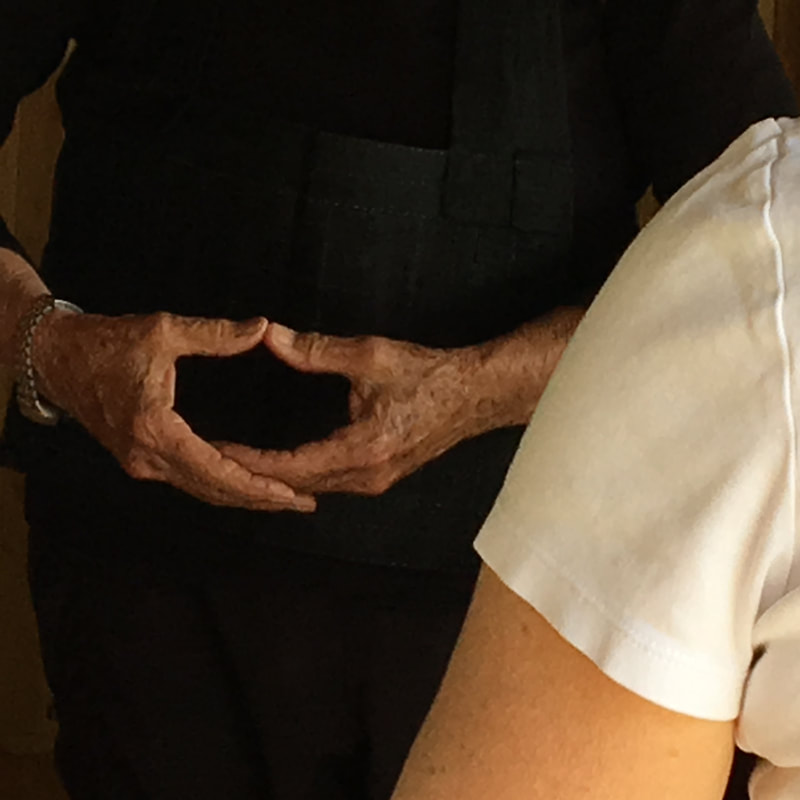|
December 8th is Rohatsu in the Zen tradition, commemorating the moment of the Buddha’s awakening. According to legend, it happened in the early morning, in the presence of Venus, the morning star. Siddhartha sat unmoving after a rough night of temptations by the demon Mara, until finally he came to a deep understanding of the cause of suffering. Can you see him there? Above him the leaves of the fig tree rustle like clapping hands, and the fragrance of the figs themselves remind him of his own appetites, his own preferences—human things. He’s been a practicing ascetic for many years. He’s close to death by starvation. Then clap! Here comes the smell of figs—the whole tree gives off the scent of abundance—and he laughs aloud. He’s enlightened!
I like this version because it involves the sensual world. The smells, the tastes, the sounds of our human lives. In another story, before Siddhartha sat beneath the tree, he lay on the ground, close to death, and a child came to him and fed him a pudding of milk and rice to restore his strength to live another day. And what a day it was. It was the day and night and early morning of his awakening, when Siddhartha became the Buddha and one of the great spiritual teachers in our human history. His life was prolonged by a child. And she (she’s portrayed as a girl named Sujata, but of course she’s anyone, everyone, just as the Buddha is anyone, everyone) represents compassion in this world. Compassion and wisdom are the two roots of Buddhist tradition. In the poet Jane Hirshfield’s words: “One great tap-word of Buddhism is compassion, which is the deep affection that we feel for everything because we’re all in it together. Be it other human beings, other animals, the planet as a whole, the creatures of this planet, the trees and rivers of this planet. Everything is connected.” About five years ago I made a decision. It arose out of my experience of anorexia when I was a twelve-year-old, and again when I was in my early twenties. I decided to make a practice of saying yes to any and all food that was offered to me, if it was offered in friendship. I learned to enjoy cookies this way, if they weren’t too sweet. Cookies were a big step for me. Then I began to discern all the other areas in my life where I said no, and I vowed to open my mind to yeses. This has been a tremendous practice for me. It’s a practice of ahimsa or kindness to self. Like the child Sujata, I offer compassion to the starving one, the ascetic, in the form of food or praise or the encouragement to go fishing in the middle of the day. I embody the child and the ascetic both, as most of us do. The jailer and the jailed. This is the time of year when ceremonies and rituals abound. Rohatsu has just passed, Hanukkah is upon us, soon enough Christmas and Kwanzaa. Take one of William Stafford’s poems with you as you walk out into the world today. This one’s called “A Ritual to Read to Each Other”: If you don't know the kind of person I am and I don't know the kind of person you are a pattern that others made may prevail in the world and following the wrong god home we may miss our star. For there is many a small betrayal in the mind, a shrug that lets the fragile sequence break sending with shouts the horrible errors of childhood storming out to play through the broken dike. And as elephants parade holding each elephant's tail, but if one wanders the circus won't find the park, I call it cruel and maybe the root of all cruelty to know what occurs but not recognize the fact. And so I appeal to a voice, to something shadowy, a remote important region in all who talk: though we could fool each other, we should consider-- lest the parade of our mutual life get lost in the dark. For it is important that awake people be awake, or a breaking line may discourage them back to sleep; the signals we give — yes or no, or maybe -- should be clear: the darkness around us is deep.
4 Comments
Carol Edelstein
12/9/2020 07:24:19 pm
Beautiful essay, Margie, full of gratitude. Thank you.
Reply
Jack Doggett
12/11/2020 11:07:01 am
Thanks for this post, Margie. It is one of Stafford's more powerful poems and one I love. Congratulations on insight and awareness of food issues. I miss our tea discussions and the FIMC sangha. Happy holidays.
Reply
12/11/2020 05:27:01 pm
How wonderful to continue to deepen in my awareness and appreciation of you, Margie. And THAT POEM. Ripples of recognition and gratitude passed through me in the reading. Thank you.
Reply
Leave a Reply. |
AboutA place to discuss writing or anything on your mind. All visitors are invited to join the conversation by commenting on posts, asking questions, and joining the newsletter below for even more opportunities to connect and converse! Archives
April 2023
Categories |


 RSS Feed
RSS Feed